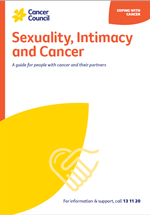Menopause
Menopause means the ovaries no longer produce eggs and periods stop. Menopause is a natural and gradual process that usually starts between the ages of 45 and 55.
Learn more about:
Early menopause
Some cancer treatments, including certain chemotherapy drugs, radiation therapy to the pelvic area, hormone therapy and surgery to remove the ovaries (oophorectomy), can cause early menopause.
If you are younger, reaching menopause much earlier than expected may affect your sense of identity and your plans to start a family or have more children. If your family is complete or you didn’t want children, you may still have mixed emotions or worry about the impact of menopause on your relationship. Learn more about fertility.
When cancer treatment causes early menopause, the impact on how you feel, your body image and your relationships can be significant. It may take time to accept these changes. Talking to your GP, a family member, friend or counsellor may help.
Symptoms of menopause
Most menopause symptoms are related to a drop in your body’s oestrogen levels. When menopause occurs suddenly because of cancer treatment, symptoms may be more severe because the body hasn’t had time to get used to the gradual decrease in hormone levels. Symptoms may include a dry or tight vagina; loss of interest in sex (low libido); hot flushes and night sweats; aching joints; trouble sleeping; dry or itchy skin; and feeling more anxious or overwhelmed.
Many of these symptoms will eventually pass, although this may take months or a few years. Some women who have already been through menopause find that these symptoms return during or after treatment.
Ways to manage menopause symptoms
- Meditation and relaxation techniques may help reduce stress and lessen symptoms. Listen to our relaxation and meditation podcast for some exercises.
- Maintain a healthy weight and eat a healthy diet with lots of fresh fruit, vegetables and wholegrains.
- Regular exercise can help improve mood, heart health, bone and muscle strength, and energy levels.
- Try cognitive behaviour therapy (CBT) . This has been shown to improve menopausal symptoms, including anxiety, sleep, hot flushes and sexual issues.
- Check your cholesterol levels as they can rise after menopause, increasing your risk of heart disease and stroke. If your levels are high, talk to your doctor about lifestyle changes or cholesterol-lowering drugs.
- Menopause can increase your risk of developing thinning of the bones (osteoporosis).
- Menopausal hormone therapy (MHT) can help reduce symptoms of menopause, but may not be recommended for some women who had hormone-dependent cancers, such as breast or ovarian cancer. Talk to your doctor about the risks and benefits of MHT for your situation.
- If you need to avoid products containing oestrogen, talk to your doctor about non-hormonal medicines that may help with menopausal symptoms such as hot flushes and night sweats.
- If vaginal dryness is a problem, take more time before and during sex to become aroused and for the vagina to become more lubricated. Use a water-based or silicone-based lubricant that has no added perfumes or colouring.
- For more information, talk to your doctor, ask for a referral to a specialist clinic or see the Australasian Menopause Society.
Podcast: Sex and Cancer
Listen to more of our podcast for people affected by cancer
More resources
Prof Michael Jefford, Medical Oncologist and Director, Australian Cancer Survivorship Centre, Peter MacCallum Cancer Centre, VIC (clinical review); Lucy Bailey, Nurse Counsellor, Cancer Council Queensland; Philip Bullas, Consumer; Dr Kate Gunn, Clinical Psychologist and Senior Research Fellow, Department of Rural Health, University of South Australia, SA; Rosemerry Hodgkin, 13 11 20 Consultant, Cancer Council WA; Prof David Joske, Clinical Haematologist, Sir Charles Gairdner Hospital and Clinical Professor of Medicine, The University of Western Australia, WA; Kim Kerin-Ayres, Clinical Nurse Consultant, Cancer Survivorship, Concord Hospital, NSW; Sally Littlewood, Physiotherapist, Seymour Health, VIC; Georgina Lohse, Social Worker, GV Health, VIC; Melanie Moore, Exercise Physiologist and Clinical Supervisor, University of Canberra Cancer Wellness Clinic, ACT; June Savva, Senior Clinician Dietitian, Nutrition and Dietetics, Monash Cancer Centre, Monash Health, VIC; Dr Elysia Thornton-Benko, Specialist General Practitioner and Research Fellow, University of New South Wales, NSW; Prof Janette Vardy, Medical Oncologist, Concord Cancer Centre and Professor of Cancer Medicine, The University of Sydney, NSW; Lyndell Wills, Consumer.
View the Cancer Council NSW editorial policy.
View all publications or call 13 11 20 for free printed copies.

